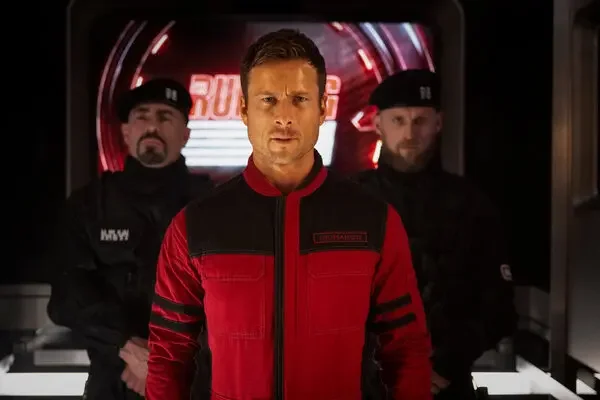The Running Man
The Running Man flops toward the finish line
Edgar Wright’s latest project marks his first time adapting a book into a film, and it’s not what we hoped for. The Running Man is adapted from Stephen King’s novel of the same name and is the second time the story has been on the big screen, the first starring Arnold Schwarzenegger (who gets a fun “cameo” in this version). Wright, working with his Scott Pilgrim vs. the World collaborator Michael Bacall, stays closer to the novel than the original adaptation, but unfortunately, the story doesn’t receive the treatment it deserves.
While the novel was set in 2025 (43 years after its publication), the film takes place in an unspecified future in America where the government controls all media and the gap between the 1% and the 99% has grown even wider. The only media aside from a Kardashian-style reality show called The Americanas are game shows, even the tamest of which involve some form of pain inflicted on a desperate everyman.
Ben Richards (Glen Powell) is an out-of-work father with a very sick toddler who cannot get her the medical care she needs. In a desperate attempt to earn some money, he auditions for one of these game shows, where he is told he is “quantifiably the angriest man to ever audition for our shows.” As you might guess, he is chosen to compete on The Running Man, which he reluctantly agrees to because of the prize money.
The show is essentially a throwback to the Roman Colosseum days of killing for sport and entertainment, saving the best kills and chases for primetime TV. We see some of these kills through a YouTuber called The Apostle (played by Daniel Ezra, who shines despite my distaste for this YouTube exposition masquerading as a subplot). Despite this promising setup for creative kills, Wright reverts to predictable fight scenes and sanitized visuals. For a director capable of fitting exaggerated deaths into even a film like Baby Driver, The Running Man is noticeably void of creativity in this area.
Powell, despite Hollywood’s push to cast him as the next Tom Cruise, lacks what it takes to be a true movie star. To be fair, some of this might be due to the writing; Wright and Bacall don’t give Richards the foil or mentor character this film needs, leaving Powell struggling to hold the audience’s interest. The audience roots for him only because the villains are so obviously evil, not out of emotional attachment to Richards.
It’s clear the producers saw their star-studded cast and crew as a shortcut to box office success, and their focus on profits is obvious through the many blatant product placements that have no place in a dystopian world. The Running Man is Edgar Wright’s first flop (something I never thought I’d say), a result of the studio having the resources to hire talented creatives but not giving them the freedom to make this film the hit it could have been.


